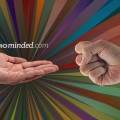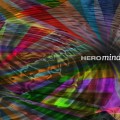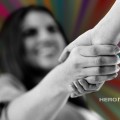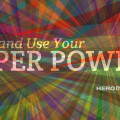It’s so much better than x-ray vision.
Hero minded people see the bigger picture – beyond their own sphere of knowledge, geography, influence and even lifetime. They maintain awareness of those on the other side of the world and the far reaches of time. They don’t just see “what’s in it for me?” — they see what’s at stake for others.
Every interaction you have with another person has the possibility to go viral. You can merely share helpful and useful information. Or you can change others for the better — and cause them to change those they contact for the better. Our impact spreads like ripples in a lake — but greater — because it doesn’t dissipate and diminish over time. Our impact often gains momentum and becomes something greater. Over time, what we say and do today can become waves in an ocean and the gravitational forces of planets.
Reminder [What does “hero minded” and “villain” mean?]
Impact
It takes very few people to create great shifts. Those that affect masses of people most often do so by acting selflessly and gaining trust. Having a vision beyond their own life was fuel when they fought against a culture that was determined to keep the status quo.
One of the most illustrative examples is the controversial (at the time) assertions of Galileo Galilei and his adherence to Copernican Heliocentrism. He insisted that the Earth was not the center of the universe. Society’s inner villain (fighting for its survival and institutions) couldn’t handle the idea that we were not central or that the scriptures could be wrong on this point. Galileo graciously argued that scripture’s description of the Sun’s movement in the sky was not to be taken literally — that it was written from the perspective of observing from on Earth. But that wasn’t good enough and created too large of a challenge to the religious leaders of that time.
At his inquisition, Galileo recanted his beliefs (to survive), albeit unsuccessfully (his recanting wasn’t believed). He was placed under house arrest and his existing and any future writings were banned. (How much more could have been learned had that society not reacted as they did?)
A popular legend maintains that after recanting the theory that the Earth revolved around the Sun, he muttered “and yet it moves.” Whether or not it’s true that he challenged them again in that moment, he had already challenged the cultural beliefs at the time, even when he risked the response to shutter him away.
His impact continued beyond the confines of his life. It took 500 years for justice to come about in his trial. We benefitted from his work and ideas and he suffered from the lack of perspective within the society he lived.
During the battle of ideas, he wrote his own scientific manifesto, attempting to change how science was practiced. Every effort we make with a greater vision of times and people we cannot yet see is valuable, even when we don’t get to reap immediate rewards. What would we do without those who were willing to champion these ideas even when it cost them so much?
Bill Maher talking to Neil DeGrasse-Tyson about his show Cosmos:
“Almost every episode [of Cosmos] is weaved with the story of a certain scientist that discovered something amazingly fundamental. It taught me that there’s maybe a few dozen people – scientists all – in the history of our planet who have discovered everything important. And all the billions of people after glommed on to that or else we would be sitting in piles of dirt and eating straw.”
He’s stating it in a funny way while making a serious point. Progress can be made by very few who are willing to see, think, act, stand. And then we all benefit.
But what if more than just a few saw, thought, acted, stood? What exponential benefits would we all experience when we all become Hero Minded?
There are as many ways to make a hero minded impact as there are people. What is your flavor of impact?
How to see further
Imagine the world 100 years beyond your lifespan. What problems are we still encountering based on behavior and decisions that are being made today? Take a moment and imagine the world you think we’ll live in.
Write down the problem that bothers you the most.
What are you doing today that makes life better for everyone that will live then? Can you do something to eradicate diseases, help people manage more productive lives, create more peace, encourage cooperation, educate more efficiently, collaborate with greater access to information?
If everything was possible, what small change would you make today that moves in the direction of that possibility? Write it down.
At the end of the day, do what is necessary so you can check it off as complete.
Write down the next small change for tomorrow.
What’s the price?
How much time is wasted trying to persuade people who cannot be persuaded? Do we risk losing or damaging relationships with people because we spoke up?
Sometimes it can feel like we’re spinning our wheels. If we want as many people as possible to adopt hero mindedness it should have some efficiency built in – focusing our efforts on those we’re most likely to affect. That makes sense.
Yet we can observe — in our own short lifetime — radical change for the better in many areas and many different kinds of people. Most of this comes about because of our wider connectedness, willingness to have discussions and entertain perspectives we hadn’t considered on our own.
It’s worth it, even if it doesn’t feel like it in the moment. Because I’m a person who went through a polar shift in perspective.
I’m forever grateful to the people who were willing to have conversations with me that altered my perspective. Some of them risked something by doing that and some of them were weary that the conversation was required of them. Even if the first conversation didn’t appear to have an effect, I was listening. I heard things that I continued to mull over. After dozens — or maybe hundreds — of interactions with new information and new perspectives, I started to see differently. I learned that the societal bubble I chose wasn’t as reliable as I believed it was. I vowed to seek and consider many differing perspectives from that point forward. The world opened up. I learned, grew and changed.
And I lost a lot of people in the process that couldn’t handle that change.
How are you confronting villains? When you see someone acting without awareness or compassion for another’s experience, how are you bringing awareness to the situation? Who are you willing to confront and who are you not bothering with? Have you abandoned discourse in certain places (the internet? family gatherings?) because “I won’t change anyone’s mind” so you feel it is a waste of time? Do differences of opinion get you too upset?
We’ll talk about how to deal with those things soon. Sign up to be a part of that conversation.
More villains than heroes
The world doesn’t always change for the better. In some ways it seems to be changing for the worse. Fear-based reactions to change are common. A world filled with amazing change will spur big reactions from inner villains. Change can be uncomfortable. Sometimes we are required to give up the comfort of our traditions and beliefs because they are challenged by new information. Sometimes circumstances beyond our control require us to sacrifice.
But some don’t want to give up those traditions or make sacrifices. They believe if they do that, they’ll have to give up other stuff, too.
We need to recognize that people are doing this when we confront or challenge the inner villain — who wants what it wants. When we challenge an inner villain, reactions can be as if we are challenging survival. Whole identities and social structures are built upon the inner villain’s survival. We don’t give up our identities and tribes easily, even when evidence and common sense says we should — because it feels like that’s a lot to lose. We can feel untethered and on our own if we challenge the cultural norm. Not everyone is brave enough to risk it.
Questions to ponder
When we’re hero minded and challenging villains, what feels like too much effort, or is too risky? What social relationships are we willing to put on the line for the betterment of future societies? How distant and expansive is our vision and how can we stretch it?
Are we just going to keep our mouth shut and stay at home, doing what we’d rather be doing? Take note that this is what our inner villain would like us to do: “Take care of you, be comfortable, and don’t rock that boat. It’s not worth it.” Is this the dialogue you’re hearing most often? Perhaps you need to have a talk with your inner villain.
Action
Commit to a hero minded action today. Reminder: [What does “hero minded” and “villain” mean?]
Big results start with small actions. Big or small, do something – taking a step toward the vision you wrote down. Imagine creating a world of hero minded people. Even small acts can require bravery and stepping out of your comfort zone (where your inner villain is bargaining for comfort, survival and safety).
Having a greater, farther, longer vision will remind you that the risk is worth it.
In a hero minded world, how much more can be accomplished because we are no longer wasting our time wrestling with our villains?

![It's better than x-ray vision. Hero minded people see the bigger picture – beyond their own sphere of knowledge, geography, influence and even lifetime. They maintain awareness for those on the other side of the world and the far reaches of time. [click image to read more]](https://www.herominded.com/wp-content/uploads/2014/07/Vision1-1038x576.jpg)




